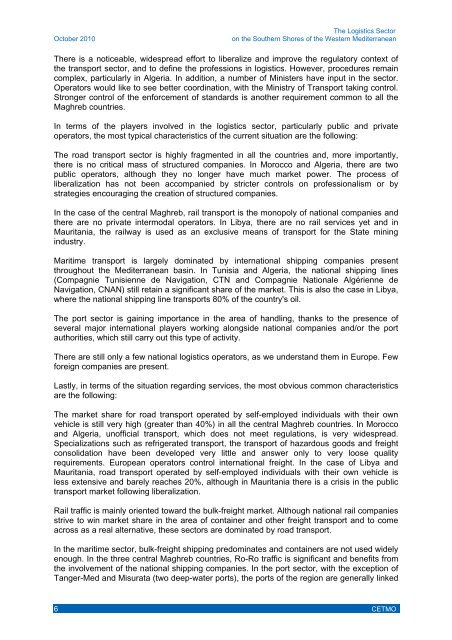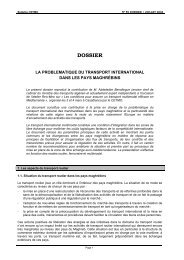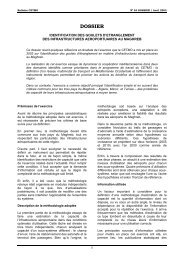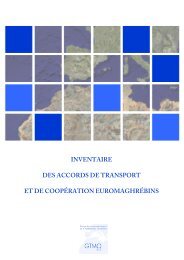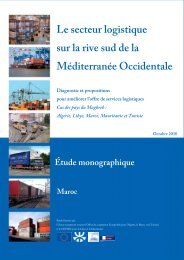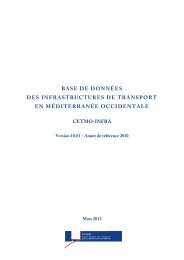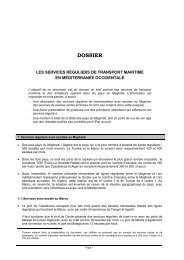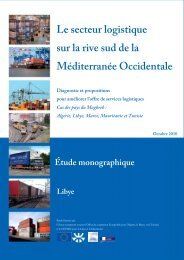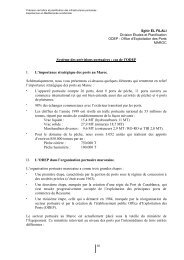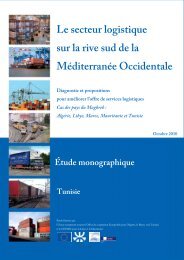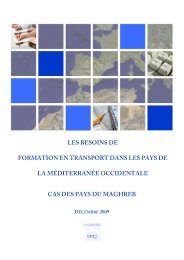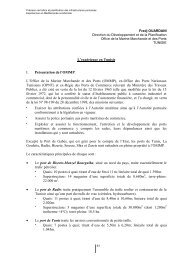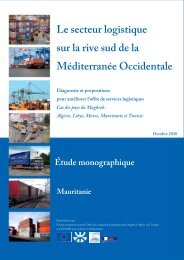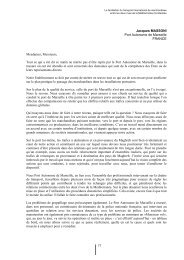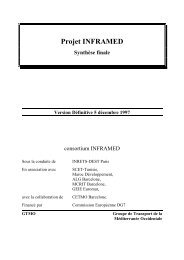October 2010<str<strong>on</strong>g>The</str<strong>on</strong>g> <str<strong>on</strong>g>Logistics</str<strong>on</strong>g> <str<strong>on</strong>g>Sector</str<strong>on</strong>g><strong>on</strong> <strong>the</strong> Sou<strong>the</strong>rn <strong>Shores</strong> <strong>of</strong> <strong>the</strong> <strong>Western</strong> Mediterranean<str<strong>on</strong>g>The</str<strong>on</strong>g>re is a noticeable, widespread effort to liberalize and improve <strong>the</strong> regulatory c<strong>on</strong>text <strong>of</strong><strong>the</strong> transport sector, and to define <strong>the</strong> pr<strong>of</strong>essi<strong>on</strong>s in logistics. However, procedures remaincomplex, particularly in Algeria. In additi<strong>on</strong>, a number <strong>of</strong> Ministers have input in <strong>the</strong> sector.Operators would like to see better coordinati<strong>on</strong>, with <strong>the</strong> Ministry <strong>of</strong> Transport taking c<strong>on</strong>trol.Str<strong>on</strong>ger c<strong>on</strong>trol <strong>of</strong> <strong>the</strong> enforcement <strong>of</strong> standards is ano<strong>the</strong>r requirement comm<strong>on</strong> to all <strong>the</strong>Maghreb countries.In terms <strong>of</strong> <strong>the</strong> players involved in <strong>the</strong> logistics sector, particularly public and privateoperators, <strong>the</strong> most typical characteristics <strong>of</strong> <strong>the</strong> current situati<strong>on</strong> are <strong>the</strong> following:<str<strong>on</strong>g>The</str<strong>on</strong>g> road transport sector is highly fragmented in all <strong>the</strong> countries and, more importantly,<strong>the</strong>re is no critical mass <strong>of</strong> structured companies. In Morocco and Algeria, <strong>the</strong>re are twopublic operators, although <strong>the</strong>y no l<strong>on</strong>ger have much market power. <str<strong>on</strong>g>The</str<strong>on</strong>g> process <strong>of</strong>liberalizati<strong>on</strong> has not been accompanied by stricter c<strong>on</strong>trols <strong>on</strong> pr<strong>of</strong>essi<strong>on</strong>alism or bystrategies encouraging <strong>the</strong> creati<strong>on</strong> <strong>of</strong> structured companies.In <strong>the</strong> case <strong>of</strong> <strong>the</strong> central Maghreb, rail transport is <strong>the</strong> m<strong>on</strong>opoly <strong>of</strong> nati<strong>on</strong>al companies and<strong>the</strong>re are no private intermodal operators. In Libya, <strong>the</strong>re are no rail services yet and inMauritania, <strong>the</strong> railway is used as an exclusive means <strong>of</strong> transport for <strong>the</strong> State miningindustry.Maritime transport is largely dominated by internati<strong>on</strong>al shipping companies presentthroughout <strong>the</strong> Mediterranean basin. In Tunisia and Algeria, <strong>the</strong> nati<strong>on</strong>al shipping lines(Compagnie Tunisienne de Navigati<strong>on</strong>, CTN and Compagnie Nati<strong>on</strong>ale Algérienne deNavigati<strong>on</strong>, CNAN) still retain a significant share <strong>of</strong> <strong>the</strong> market. This is also <strong>the</strong> case in Libya,where <strong>the</strong> nati<strong>on</strong>al shipping line transports 80% <strong>of</strong> <strong>the</strong> country's oil.<str<strong>on</strong>g>The</str<strong>on</strong>g> port sector is gaining importance in <strong>the</strong> area <strong>of</strong> handling, thanks to <strong>the</strong> presence <strong>of</strong>several major internati<strong>on</strong>al players working al<strong>on</strong>gside nati<strong>on</strong>al companies and/or <strong>the</strong> portauthorities, which still carry out this type <strong>of</strong> activity.<str<strong>on</strong>g>The</str<strong>on</strong>g>re are still <strong>on</strong>ly a few nati<strong>on</strong>al logistics operators, as we understand <strong>the</strong>m in Europe. Fewforeign companies are present.Lastly, in terms <strong>of</strong> <strong>the</strong> situati<strong>on</strong> regarding services, <strong>the</strong> most obvious comm<strong>on</strong> characteristicsare <strong>the</strong> following:<str<strong>on</strong>g>The</str<strong>on</strong>g> market share for road transport operated by self-employed individuals with <strong>the</strong>ir ownvehicle is still very high (greater than 40%) in all <strong>the</strong> central Maghreb countries. In Moroccoand Algeria, un<strong>of</strong>ficial transport, which does not meet regulati<strong>on</strong>s, is very widespread.Specializati<strong>on</strong>s such as refrigerated transport, <strong>the</strong> transport <strong>of</strong> hazardous goods and freightc<strong>on</strong>solidati<strong>on</strong> have been developed very little and answer <strong>on</strong>ly to very loose qualityrequirements. European operators c<strong>on</strong>trol internati<strong>on</strong>al freight. In <strong>the</strong> case <strong>of</strong> Libya andMauritania, road transport operated by self-employed individuals with <strong>the</strong>ir own vehicle isless extensive and barely reaches 20%, although in Mauritania <strong>the</strong>re is a crisis in <strong>the</strong> publictransport market following liberalizati<strong>on</strong>.Rail traffic is mainly oriented toward <strong>the</strong> bulk-freight market. Although nati<strong>on</strong>al rail companiesstrive to win market share in <strong>the</strong> area <strong>of</strong> c<strong>on</strong>tainer and o<strong>the</strong>r freight transport and to comeacross as a real alternative, <strong>the</strong>se sectors are dominated by road transport.In <strong>the</strong> maritime sector, bulk-freight shipping predominates and c<strong>on</strong>tainers are not used widelyenough. In <strong>the</strong> three central Maghreb countries, Ro-Ro traffic is significant and benefits from<strong>the</strong> involvement <strong>of</strong> <strong>the</strong> nati<strong>on</strong>al shipping companies. In <strong>the</strong> port sector, with <strong>the</strong> excepti<strong>on</strong> <strong>of</strong>Tanger-Med and Misurata (two deep-water ports), <strong>the</strong> ports <strong>of</strong> <strong>the</strong> regi<strong>on</strong> are generally linked6 CETMO
<str<strong>on</strong>g>The</str<strong>on</strong>g> <str<strong>on</strong>g>Logistics</str<strong>on</strong>g> <str<strong>on</strong>g>Sector</str<strong>on</strong>g><strong>on</strong> <strong>the</strong> Sou<strong>the</strong>rn <strong>Shores</strong> <strong>of</strong> <strong>the</strong> <strong>Western</strong> Mediterranean October 2010to European ports by feeder lines. <str<strong>on</strong>g>The</str<strong>on</strong>g>y need investment to improve operati<strong>on</strong>s and, moreparticularly, to create ocean transit ports like Djen-Djen in Algeria and Enfidha in Tunisia.Industrial and commercial companies carry out <strong>the</strong>ir logistics operati<strong>on</strong>s in-house.Companies with enough capacity to act as 3PL providers are rare and few Europeancompanies are established in <strong>the</strong> Maghreb. <str<strong>on</strong>g>Logistics</str<strong>on</strong>g> hubs are too scarce and <strong>the</strong> logisticsoperatorsector needs regulating.2. Challenges and Competitiveness <strong>of</strong> <str<strong>on</strong>g>Logistics</str<strong>on</strong>g>-<str<strong>on</strong>g>Sector</str<strong>on</strong>g> OperatorsTo improve <strong>the</strong> logistics services sector, <strong>the</strong> countries in <strong>the</strong> regi<strong>on</strong> need to meet a number<strong>of</strong> challenges, which implies overcoming <strong>the</strong> structural market weaknesses discussed inparagraph 1 <strong>of</strong> this report.<str<strong>on</strong>g>The</str<strong>on</strong>g> fact is that all <strong>of</strong> <strong>the</strong>se countries show very high logistics costs (around 20% <strong>of</strong> GDP),al<strong>on</strong>g with str<strong>on</strong>g pricing competiti<strong>on</strong> in certain markets. This c<strong>on</strong>tradicti<strong>on</strong> is due tocompanies carrying out most transport and logistics operati<strong>on</strong>s in-house without subc<strong>on</strong>tractingto outside operators, as well as sub-standard, highly inefficient services andadministrative procedures which exacerbate such problems, though <strong>the</strong>y do not cause <strong>the</strong>m.<str<strong>on</strong>g>The</str<strong>on</strong>g> competitiveness <strong>of</strong> <strong>the</strong> logistics sector was analysed using Michael Porter's frameworkknown as <strong>the</strong> five forces model in order to try to evaluate where pressure is being exerted,with a number <strong>of</strong> comm<strong>on</strong> characteristics being noted:• Clients are not generally very demanding as regards <strong>the</strong> improvement <strong>of</strong> services, <strong>on</strong> <strong>the</strong><strong>on</strong>e hand because public-sector demand still plays a major role and, <strong>on</strong> <strong>the</strong> o<strong>the</strong>r hand,because <strong>the</strong>re are ec<strong>on</strong>omic sectors which have been developed little, or levels <strong>of</strong> lowincomeend-c<strong>on</strong>sumers. In countries with little export diversity like Algeria, Libya andMauritania, foreign trade does not exert much pressure <strong>on</strong> improving services ei<strong>the</strong>r.• Suppliers' c<strong>on</strong>tributi<strong>on</strong> to competitiveness is more positive, in particular in <strong>the</strong> domain <strong>of</strong>infrastructure, but suffers from two major shortfalls: <strong>the</strong> lack <strong>of</strong> logistics activities z<strong>on</strong>esand very inadequate specific vocati<strong>on</strong>al training, in <strong>the</strong> opini<strong>on</strong> <strong>of</strong> nearly all <strong>the</strong> peopleinterviewed.• <str<strong>on</strong>g>The</str<strong>on</strong>g> barriers stopping new operators entering <strong>the</strong> markets are less and less numerous, inparticular in Morocco and Tunisia, both <strong>of</strong> which have implemented changes in <strong>the</strong>irlegislati<strong>on</strong> to bring <strong>the</strong>m c<strong>on</strong>siderably closer to <strong>the</strong> European model. Processes <strong>of</strong>liberalizati<strong>on</strong> have not, however, been accompanied by government strategies aimed a<strong>the</strong>lping private companies, while <strong>the</strong> number <strong>of</strong> small operators, which can <strong>of</strong>ten <strong>on</strong>lysurvive by infringing regulati<strong>on</strong>s or setting rates below actual costs, has increased, with<strong>the</strong> pernicious effects this implies for structured companies.• As for pressure coming from o<strong>the</strong>r competing regi<strong>on</strong>s to force <strong>the</strong> competitiveness <strong>of</strong> <strong>the</strong>transport and logistics sector, <strong>the</strong> prime candidates are countries in Eastern Europe and<strong>the</strong> Eastern Mediterranean, notably Turkey and Egypt (al<strong>on</strong>g with Libya). Such pressureis relative, however, given <strong>the</strong> difficulty <strong>of</strong> c<strong>on</strong>trolling domestic traffic, in particular inAlgeria and Libya.• Lastly, <strong>the</strong> weight <strong>of</strong> internal rivalry is not enough to increase competitiveness within <strong>the</strong>sector. On <strong>the</strong> <strong>on</strong>e hand, independently <strong>of</strong> <strong>the</strong>ir level <strong>of</strong> efficiency, public operators gainaccess to public-sector c<strong>on</strong>tracts more easily. On <strong>the</strong> o<strong>the</strong>r hand, <strong>the</strong> lack <strong>of</strong> c<strong>on</strong>trolsallows a good number <strong>of</strong> small companies to maintain <strong>the</strong>ir margins without having toincrease <strong>the</strong>ir productivity or modernize.CETMO 7
- Page 1: The Logist
- Page 4 and 5: Study financed byEuropean Comission
- Page 6 and 7: October 2010The <s
- Page 8 and 9: October 2010The <s
- Page 10 and 11: October 2010The <s
- Page 12 and 13: October 2010The <s
- Page 16 and 17: October 2010The <s
- Page 18 and 19: October 2010The <s
- Page 20 and 21: October 2010The <s
- Page 22 and 23: October 2010The <s
- Page 24 and 25: October 2010The <s
- Page 26 and 27: October 2010The <s
- Page 28 and 29: October 2010The <s
- Page 30 and 31: October 2010The <s
- Page 32 and 33: October 2010The <s
- Page 34 and 35: October 2010The <s
- Page 36 and 37: October 2010The <s
- Page 38 and 39: October 2010The <s
- Page 40 and 41: October 2010The <s
- Page 42 and 43: October 2010The <s
- Page 44 and 45: October 2010The <s
- Page 46 and 47: October 2010The <s
- Page 48 and 49: October 2010The <s
- Page 50 and 51: October 2010The <s
- Page 52 and 53: October 2010The <s
- Page 54 and 55: October 2010The <s
- Page 56 and 57: October 2010The <s
- Page 58 and 59: October 2010The <s
- Page 60 and 61: October 2010The <s
- Page 62 and 63: October 2010The <s
- Page 64 and 65:
October 2010The <s
- Page 66 and 67:
October 2010The <s
- Page 68 and 69:
October 2010The <s
- Page 70 and 71:
October 2010The <s
- Page 72 and 73:
October 2010The <s
- Page 74 and 75:
October 2010The <s
- Page 76 and 77:
October 2010The <s
- Page 78 and 79:
October 2010The <s
- Page 80 and 81:
October 2010The <s
- Page 82 and 83:
October 2010The <s
- Page 84 and 85:
October 2010The <s
- Page 86 and 87:
October 2010The <s
- Page 88 and 89:
October 2010The <s
- Page 90 and 91:
October 2010The <s
- Page 92 and 93:
October 2010The <s
- Page 94 and 95:
October 2010The <s
- Page 96 and 97:
October 2010The <s
- Page 98 and 99:
October 2010The <s
- Page 100 and 101:
October 2010The <s
- Page 102 and 103:
October 2010The <s
- Page 104 and 105:
October 2010The <s
- Page 106 and 107:
October 2010The <s
- Page 108 and 109:
October 2010The <s
- Page 110 and 111:
October 2010The <s
- Page 112 and 113:
October 2010The <s
- Page 114 and 115:
October 2010The <s
- Page 116 and 117:
October 2010The <s
- Page 118 and 119:
October 2010The <s
- Page 120 and 121:
October 2010The <s
- Page 122 and 123:
October 2010The <s
- Page 124 and 125:
October 2010The <s
- Page 126 and 127:
October 2010The <s
- Page 128 and 129:
October 2010maghrébineSynthèse<st
- Page 130 and 131:
October 2010The <s
- Page 132 and 133:
October 2010The <s
- Page 134 and 135:
October 2010The <s
- Page 136 and 137:
October 2010The <s
- Page 138 and 139:
October 2010The <s
- Page 140 and 141:
October 2010The <s
- Page 142 and 143:
October 2010The <s
- Page 144 and 145:
October 2010The <s
- Page 146 and 147:
October 2010The <s
- Page 148 and 149:
October 2010The <s
- Page 150 and 151:
October 2010The <s
- Page 152 and 153:
October 2010The <s
- Page 154 and 155:
October 2010The <s
- Page 156 and 157:
October 2010The <s
- Page 158 and 159:
October 2010The <s
- Page 160 and 161:
October 2010The <s
- Page 162 and 163:
October 2010The <s
- Page 164 and 165:
October 2010The <s
- Page 166 and 167:
October 2010The <s
- Page 168 and 169:
October 2010The <s
- Page 170 and 171:
October 2010The <s
- Page 172 and 173:
October 2010The <s
- Page 174 and 175:
October 2010Favourable FactorsReinf
- Page 176 and 177:
October 2010The <s
- Page 178 and 179:
October 2010The <s
- Page 180 and 181:
October 2010Essor des relationsavec
- Page 182 and 183:
October 2010The <s
- Page 184 and 185:
October 2010WeaknessesNo strategy f
- Page 186 and 187:
October 2010The <s
- Page 188 and 189:
October 2010The <s
- Page 190 and 191:
October 2010Accroissement durôle d
- Page 192 and 193:
October 2010The <s
- Page 194 and 195:
October 2010The <s
- Page 196 and 197:
October 2010The <s
- Page 198 and 199:
October 2010The <s
- Page 200 and 201:
October 2010The <s
- Page 202:
October 2010The <s


